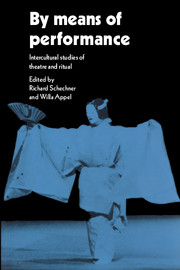Book contents
- Frontmatter
- Contents
- List of figures
- Notes on contributors
- Concerning Victor Turner
- Introduction
- 1 Are there universals of performance in myth, ritual, and drama?
- 2 Magnitudes of performance
- 3 Liminality: a synthesis of subjective and objective experience
- 4 The Yaqui deer dance at Pascua Pueblo, Arizona
- 5 A Yaqui point of view: on Yaqui ceremonies and anthropologists
- 6 Performance of precepts/precepts of performance: Hasidic celebrations of Purim in Brooklyn
- 7 The significance of performance for its audience: an analysis of three Sri Lankan rituals
- 8 What does it mean to “become the character”: power, presence, and transcendence in Asian in-body disciplines of practice
- 9 Korean shamans: role playing through trance possession
- 10 The practice of noh theatre
- 11 The profanation of the sacred in circus clown performances
- 12 Ethnographic notes on sacred and profane performance
- 13 The spatial sense of the sacred in Spanish America and the American South and its tie with performance
- 14 Space and context
- 15 The transformation of consciousness in ritual performances: some thoughts and questions
- 16 Universals of performance; or amortizing play
- Appendix
- Bibliography
- Index
15 - The transformation of consciousness in ritual performances: some thoughts and questions
Published online by Cambridge University Press: 05 June 2012
- Frontmatter
- Contents
- List of figures
- Notes on contributors
- Concerning Victor Turner
- Introduction
- 1 Are there universals of performance in myth, ritual, and drama?
- 2 Magnitudes of performance
- 3 Liminality: a synthesis of subjective and objective experience
- 4 The Yaqui deer dance at Pascua Pueblo, Arizona
- 5 A Yaqui point of view: on Yaqui ceremonies and anthropologists
- 6 Performance of precepts/precepts of performance: Hasidic celebrations of Purim in Brooklyn
- 7 The significance of performance for its audience: an analysis of three Sri Lankan rituals
- 8 What does it mean to “become the character”: power, presence, and transcendence in Asian in-body disciplines of practice
- 9 Korean shamans: role playing through trance possession
- 10 The practice of noh theatre
- 11 The profanation of the sacred in circus clown performances
- 12 Ethnographic notes on sacred and profane performance
- 13 The spatial sense of the sacred in Spanish America and the American South and its tie with performance
- 14 Space and context
- 15 The transformation of consciousness in ritual performances: some thoughts and questions
- 16 Universals of performance; or amortizing play
- Appendix
- Bibliography
- Index
Summary
What do we mean by transformation in consciousness?
Everyday usage suggests a transformation is a major and lasting change: in structure, appearance, character or function. One becomes something else, and since we are emphasizing consciousness, we must add, one has an altered state of consciousness, a new perception of oneself or one's socio/physical world, a conversion in awareness, belief, sentiment, knowledge, understanding; a revised and enduring emergent state of mind and emotion.
The term consciousness focuses us on an individual, subjective state, rather than that of a collectivity or sociological relationship, which may of course also be transformed. In short, we are brought into an area where anthropology is traditionally weak and vague: the examination of subjective experiences, psychological states, non-normative and often unconscious information where maximum sensitivity, subtlety, inference and courage are required of an ethnographer, not to mention psychological sophistication and depth of experience in and knowledge of the language and culture in which observations are being made. Many anthropologists have followed Max Gluckman's admonition and considered the psychological domain simply off-limits, a form of esoteric knowledge not within the expertise of anthropology. But there are other reasons that may prevent the anthropologist from clarifying the change in consciousness that transformation implies. The more powerful altered states: trance, ecstasy, possession, obsession, conversion, and the like, are often regarded as ineffable.
- Type
- Chapter
- Information
- By Means of PerformanceIntercultural Studies of Theatre and Ritual, pp. 245 - 249Publisher: Cambridge University PressPrint publication year: 1990
- 8
- Cited by



